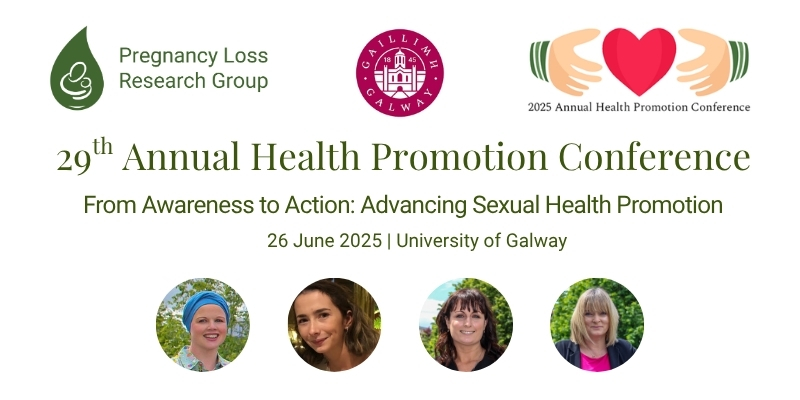News and media
Advancing Sexual Health Promotion: 2025 Annual Health Promotion Conference and new National Sexual Health Strategy

Members of the Pregnancy Loss Research Group attended and presented work from the SPRING project at the 29th Annual Health Promotion Conference in Galway on 26 June. This year’s conference focused on ‘From Awareness to Action: Advancing Sexual Health Promotion’, with the new National Sexual Health Strategy 2025–2035 published by the Department of Health the previous day.
In a morning parallel session on Training and Education for Sexual Health Promotion, Marita Hennessy PhD and Zara Harnett presented a paper on ‘Laying the foundations for integrating pregnancy loss and fertility awareness and knowledge within second-level education’; work published earlier this year in Health Promotion International. Dr Laura Linehan then presented follow-on work focused on ‘Co-creating educational resources with young people to enhance pregnancy loss and fertility awareness’. Both talks showcased research and activities undertaken in collaboration with students and staff at St Angela’s College Cork as part of the SPRING (Supporting Pregnancy & Reproductive Health Information for Teenagers) Project. This primary aim of this project is to improve knowledge at secondary school age level of issues in relation to fertility difficulties and pregnancy loss, including miscarriage and stillbirth. Other talks during the session focused on consent education for student teachers (Ms Catherine Corbett and Ms Tonya Pell, University of Galway), tackling misogyny and sexism in Irish schools (Dr Conor Hogan, University of Galway) and relationship education (Ms Ciara Tyrrell, COPE Galway), with areas of commonality with our work noted, despite the different topic areas.
More information about the conference
Welcome and opening remarks were provided by Professor Colette Kelly (Health Promotion Research Centre, University of Galway), Professor Peter McHugh (Interim President University of Galway), Jennifer Murnane O’Connor TD (Minister of State at the Department of Health with special responsibility for Public Health, Well Being and the National Drugs Strategy (pre-recorded)) and Professor Philip Dodd (Deputy Chief Medical Officer Department of Health). In his speech, Professor Dodd shared a vision for a healthier, safer and more compassionate Ireland arising from the implementation of the new National Sexual Health Strategy.
During the morning plenary session, Professor Kaye Wellings (The London School of Hygiene & Tropical Medicine) reflected on 50 years of sexual health policy and practice, providing thought-provoking insights into the evolution of sexual health promotion (and indeed public health) and current challenges. Dr Fiona Mansergh (Assistant Principal, Department of Health) then spoke about sexual health policy in Ireland, focusing on the previous and current National Sexual Health Strategies. The four key goals of the new strategy are to support: sexual health promotion and education; sexual health services; contraception and unplanned pregnancy; sexual health surveillance, monitoring, evaluation and research. At the Pregnancy Loss Research Group, we welcome the Strategy and in particular the broadening of pregnancy loss-related supports. In line with Action 45, “pregnancy and post-termination counselling services will be reconfigured to meet evolving needs of public patients including, but not limited to; recurrent miscarriage, unsuccessful fertility treatment and complex menopause”. We would welcome a greater focus on sexual and reproductive health in future policies and action plans.
In the afternoon plenary session, Professor Fiona Lyons (St James’s Hospital Dublin and HSE Sexual Health Programme) spoke about the journey to reducing sexually transmitted infections in Ireland, noting advances via national condom distribution service, the home STI testing service and the HIV PrEP programme. Ms Sally Aquilina (Rape Crisis Ireland) then highlighted data around sexual violence and abuse in Ireland. Finally, Dr András Költő (University of Galway) spoke about sexual health across the life course, drawing on evidence from past and future population health studies in Ireland including the Health Behaviour in School Children Study (generating data since 2010) and the forthcoming Irish National Survey of Sexual Health (INISH). A key message from Dr Költő’s talk was that there are systemic powers that are (still) keeping sexual and reproductive health issues silent – which we could concur with, including in relation to pregnancy loss. Despite improvements in recent years, more work is needed to address structural and systemic factors to improve experiences and outcomes across all forms of pregnancy endings.
Many thanks to the conference Co-Chairs, Dr András Költő and Professor Saoirse Nic Gabhainn, and all involved in the organisation of this event, as well as all who took part. The conference brought a great mix of researchers, policymakers, practitioners and educators together, with lots of opportunities for shared learning and collaborations.


